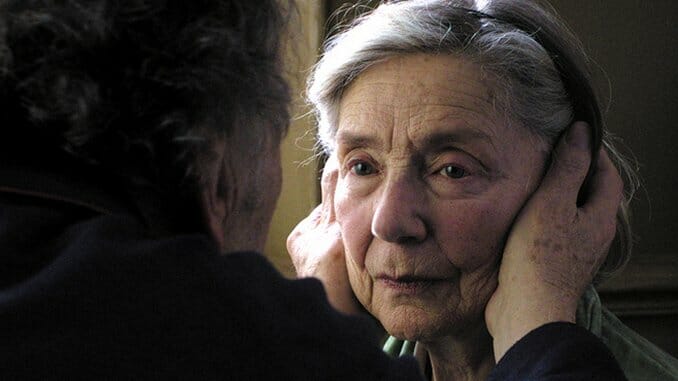
Austrian filmmaker and sometime provocateur Michael Haneke has mellowed out a bit over the last few years, as evidenced by 2009’s The White Ribbon, a slow-motion, black-and-white exploration of societal decay. (Even his least disturbing films are kind of disturbing.) His latest film, the mundanely horrifying and extremely powerful Amour, follows suit. Even at his most outrageous (depending on one’s stomach for turpitude), Haneke has allows the small, creeping details to do the disturbing rather than extreme images of violence. In films like Benny’s Video and both versions of Funny Games, horrible things happen. But Haneke instills the viewer with a sense of dread more through implied events and the placid reactions surrounding them than through the acts themselves. Amour elicits these reactions from its audience as well, even though the subject matter may not seem like the vehicle for it. As in Funny Games, there is an intruder in this film that is beyond the control of its protagonists. In this case, however, it’s old age and illness that are the threat.
Amour opens jarringly, as the police break down the door to a well-heeled Parisian apartment. They follow a sickening odor to the decomposing body of an elderly woman peacefully lying in bed in her Sunday best. From here, the film flashes back to what leads up to these events. Georges (Jean-Louis Trintignant) and Anne (Emmanuelle Riva) are in their eighties and are spending the evening attending a former student’s classical piano concert. The two were musicians and teachers, and have settled into a comfortable retirement, enjoying simple pleasures like breakfast and musical performances together. In the morning, Anne suffers a stroke. It’s an unnerving scene, as she freezes in the middle of a conversation, unable to respond to Georges’ attempts to snap her out of it. When she recovers, she remembers nothing. Eventually, she undergoes an unsuccessful surgery and proceeds to become further debilitated. The couple’s daughter, Eva, played by the still beautiful and engaging Isabelle Huppert, shows up to check in on her parents during a break from her busy musician’s life. But she seems to be more of a burden than a comfort to her parents.
Georges tends to Anne dutifully and without resentment as her condition worsen. It is both touching and heartbreaking to watch him care for her as she reverts to an infant-like state, unable to walk, feed herself or even go to the bathroom. It seems the trope about the elderly being like babies can indeed be a harsh reality. After the operation, Anne makes it clear that she does not want to go back to the hospital under any condition. Meanwhile, it becomes increasingly evident that she does not wish to continue to live in her current state. Georges cannot acknowledge her wishes, until finally he can, and does—a revelation that has life-altering consequences.
Amour simultaneously illuminates the horrors and beauty of aging. Who would not wish to live until their twilight years like Georges and Anne, comfortably enjoying their last decade of life? On the flip side, who would not be ruined by seeing one’s spouse reduced to incoherent babbling and incontinence? Haneke lets it play out gently and without exploitation; this relationship and the events occurring onscreen feel real and relatable, but poetic all the same. An occasional nightmare infiltrates the proceedings, a disquieting interlude in the upper middle class comfort that Georges and Anne have existed in for most of their lives. Haneke uses no soundtrack music, allowing the brief moments of classical piano even greater impact and beauty. Amour is truly a great film, one that leaves the viewer feeling unsettled, but also pondering what it means to truly love and care for someone.
Director: Michael Haneke
Writer: Michael Haneke
Starring: Jean-Louis Trintignant, Emmanuelle Riva, Isabelle Huppert
Release Date: Dec. 19, 2012